Post-Symposium
The Enhancing Equity in Ontario Elementary Education Symposium was held virtually and in-person at Toronto Metropolitan University, on October 11th and 12th, 2023. Enhancing Equity in Ontario Education is a project led by Dr. Sejal Patel (Early Childhood Studies, Toronto Metropolitan University), in partnership with Dr. Alana Butler from Queen's University, Dr. Adam Davies from University of Guelph, Dr. George Dei from University of Toronto, Dr. Nicholas Ng-A-Fook from University of Ottawa, Dr. Vidya Shah from York University, Dr. Janelle Brady and Dr. Kathryn Underwood from Toronto Metropolian University, Tesa Fiddler from Thunder Bay Catholic District School Board, Max Cooke from EdCan Network, Stephen Hurley from voicEd Radio, Courtnay McFarlane from Regent Park Community Health Centre, and Annie Kidder and Dr. Robin Liu Hopson from People for Education.
The Symposium invited participation by all Ontario district school boards, education stakeholders, and scholars focused on educational equity and human rights (considering Black and Indigenous students, newcomer/international students, racialized students, students living in low socioeconomic neighbourhoods, student who identify as 2SLGBTQIA+, disabled students, and other intersectionalities), to allow for sharing of promising practices around equity-based initiatives, along with providing space to reflect on and commit to taking greater action in support of enhanced equity for elementary school students.
Symposium Recap
As we begin 2024, we reflect on the inspiring conversations that took place at the Enhancing Equity in Ontario Elementary Education symposium. The symposium provided opportunities to share and consider promising practices regarding enhancing equity for elementary students. We received wonderful feedback about the logistics, moderated discussions, panels, and presentations, and are grateful for all of the dialogue and action that the symposium attendees continue to inspire.
Our heartfelt appreciation goes out to all of the presenters, symposium staff and volunteers. Your collaboration, support, and effort helped to ensure that the symposium ran as smoothly as possible.
Thank you all for your participation in this important event. Stay tuned for podcasts and symposium proceedings, which will be mobilized through this website.
Panel Summary Reports
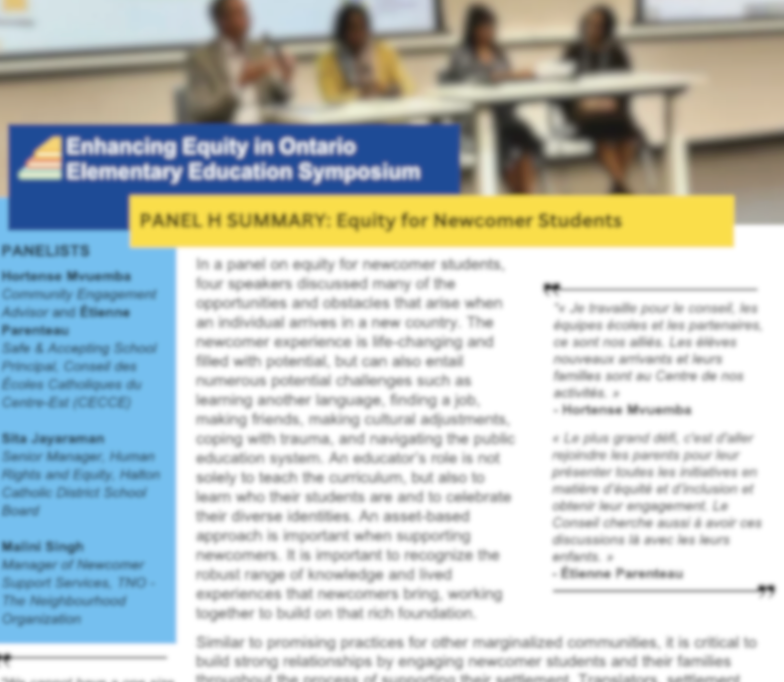
To review a summary report based on each panel presentation from the Enhancing Equity in Ontario Elementary Education Symposium, see the Panel Summary Reports tab.
Symposium Podcasts
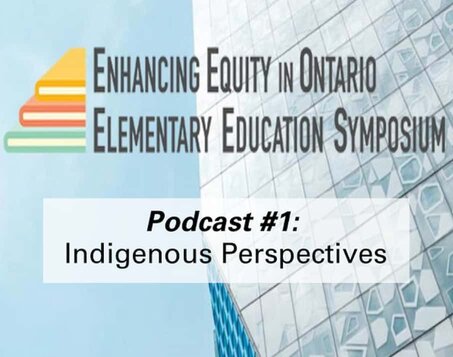
Hosted by Stephen Hurley (Executive Director at voicEd Radio) and Dr. Nicholas Ng-A-Fook (Professor and Vice Dean of Graduate Programs, University of Ottawa), who are joined by Kiera Brant-Birioukov (Kanyen’kehà:ka from Kenhtè:ke [Tyendinaga Mohawk Territory], Assistant Professor at York University); Kyrstin Dumont (Band member of the Algonquins of Kitigan Zibi, advocate, educator, and mentor); Stephanie Sanders (Ojibwe Anishinaabekwe from Curve Lake, blended with Spanish and French. M.Ed. student at the University of Ottawa, and an Indigenous Education Learning Partner with the Ottawa Catholic School Board); Marissa Magneson (Cree-Métis artist, photographer, educator, workshop facilitator, PhD student in the Faculty of Education at York University. Elected Youth Representative for the Toronto and York Region Métis Council); Roxanne Gillis (Indigenous M.Ed. student at York University, with a double major in Indigenous studies and Gender and Women’s studies. Indigenous consultant for the City of Toronto, and as a human trafficking survivor, works with the Native Women's Association of Canada); and Melissa Somer (Saulteaux Anishinaabekwe from Little Saskatchewan of the Interlake tribes, Buffalo Clan, blended with Pennsylvanian Dutch. ECE and student in the Masters of Urban Indigenous Education program. Facilitator, educator, and presenter for George Brown College, York University, and the TDSB).
For more information about each speaker and their work, see the Podcasts tab (opens in new window) .
In this podcast, participants shared their perspectives on equity, informed by their Indigenous worldviews and lived experiences. The discussion was guided by the following questions:
- What is equity for each of you in terms of your lived experiences and in terms of your current work in relation to settler colonial K-6 public and private schooling systems in Ontario?
- What are some of the historical and/or ongoing individual, structural, systemic and societal barriers?
- What is some of the professional (un)learning work taking place to support students?
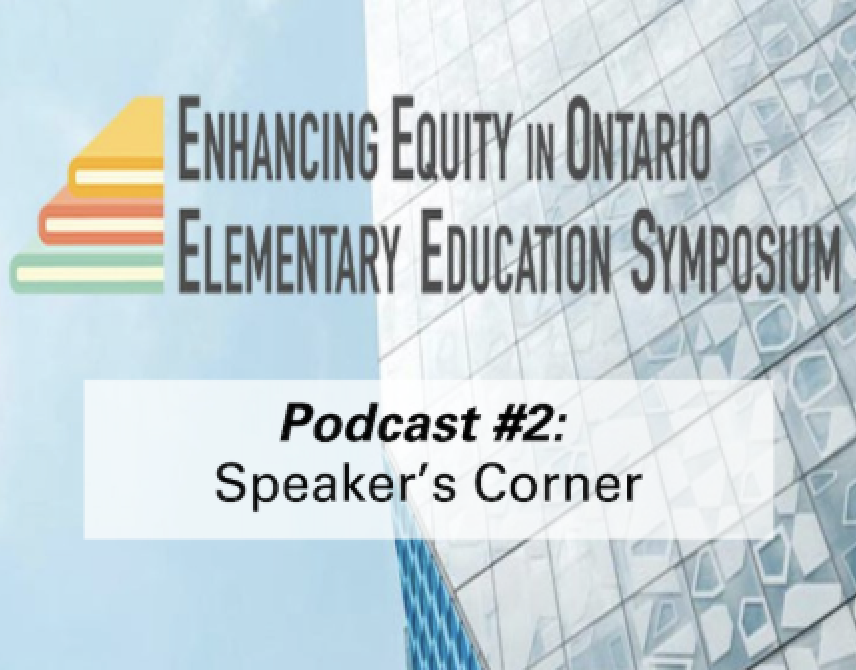
In this episode of Enhancing Equity in Elementary Education, host Stephen Hurley engages in a powerful Speaker's Corner conversation with Atala Andratis, who is the Equity Lead for the Grand Erie District School Board. They discuss the meaning of and importance of equity in education, the need for dialogue when working to dismantle barriers, and creating inclusive environments for all students. Atala shares her personal experiences as an educator and as someone who is multilingual, emphasizing the need for an asset-based lens when working with diverse student populations.
Some key messages from this episode include:
- Equity in education involves not only providing what everyone needs, but also removing systemic barriers that prevent students from accessing what they require to be successful.
- Building relationships with students through genuine listening and working to understand their diversity, is essential for creating transformative and responsive learning environments.
- Educators hold immense power and responsibility in making decisions that significantly impact student's lives, and they must approach this sacred trust with care and awareness.
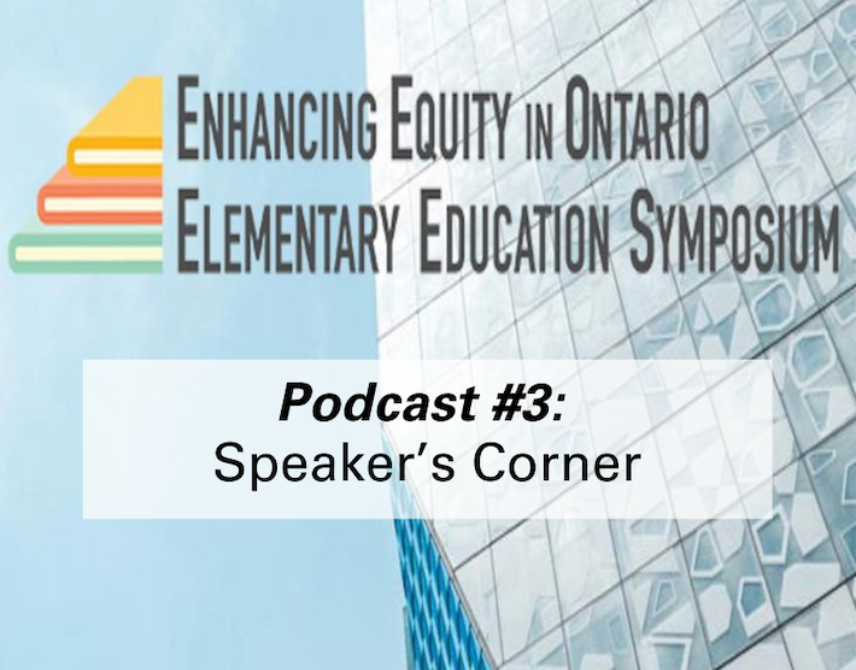
In this episode of Enhancing Equity in Elementary Education, host Stephen Hurley engages in an insightful Speaker’s Corner conversation with Ingrid Palmer, the founder of Focus on Ability and the Principal IDEAL Advocate at Realize. Ingrid shares about the importance of educational equity for students with disabilities, including her perspectives on inclusive practices and the role of language in fostering equity. Drawing from her extensive experiences and personal journey, Ingrid offers reflections on creating an educational landscape that is equitable and supportive of all students.
Some key messages from this episode include:
- Language in disability advocacy: The conversation highlights differing perspectives on language around disability.
- Promoting inclusive education: Ingrid discusses strategies for supporting students with disabilities in schools, and advocates for a collective lens and supporting equity to reduce stigma and enhance inclusion.
- Authentic community engagement: Emphasizing the need for community voices in decision-making, Ingrid calls for a shift in how institutions engage with communities, and advocates for community-led initiatives in addressing systemic barriers.
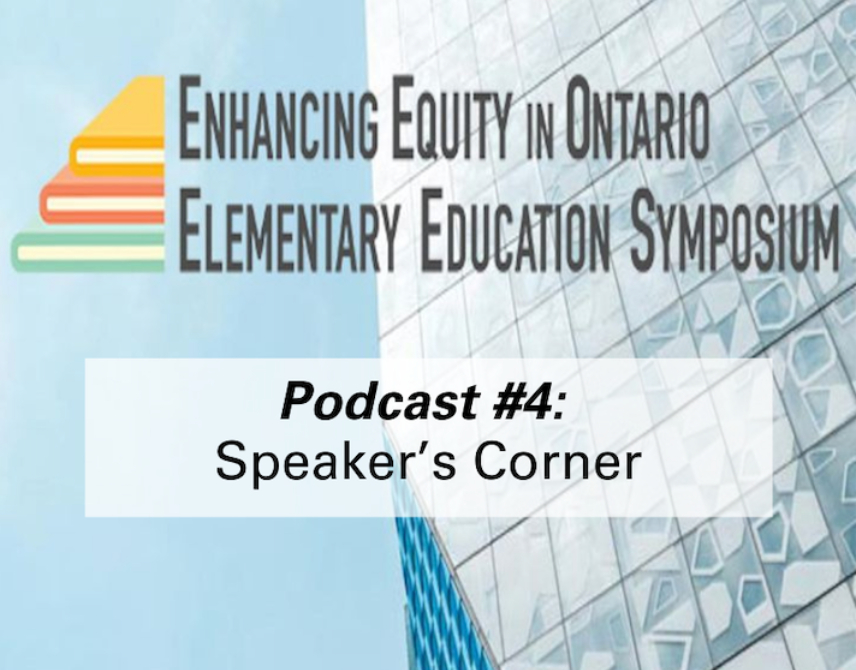
In this episode of Enhancing Equity in Elementary Education, Stephen Hurley interviews Karen Murray, a System Superintendent for Equity, Anti-oppression, and Early Years in the Toronto District School Board. Throughout this insightful Speaker’s Corner conversation, Stephen and Karen discuss the importance of equity work in education, Karen's book which provides practical examples from educators, "My Best Idea: Culturally Relevant Pedagogy", and her passion for equity in education. Karen emphasizes the importance of creating learning experiences that affirm and empower all students.
Some key messages from this episode include:
- Equity work needs to be braided into everyday teaching practices, not treated as a separate initiative.
- Educators should honor community and family knowledge by inviting families to share the different ways they engage with subjects at home, and also share their approaches in the classroom with families.
- Culturally Relevant Pedagogy (CRP) is about setting high expectations, demonstrating cultural competence, and developing students' critical consciousness.
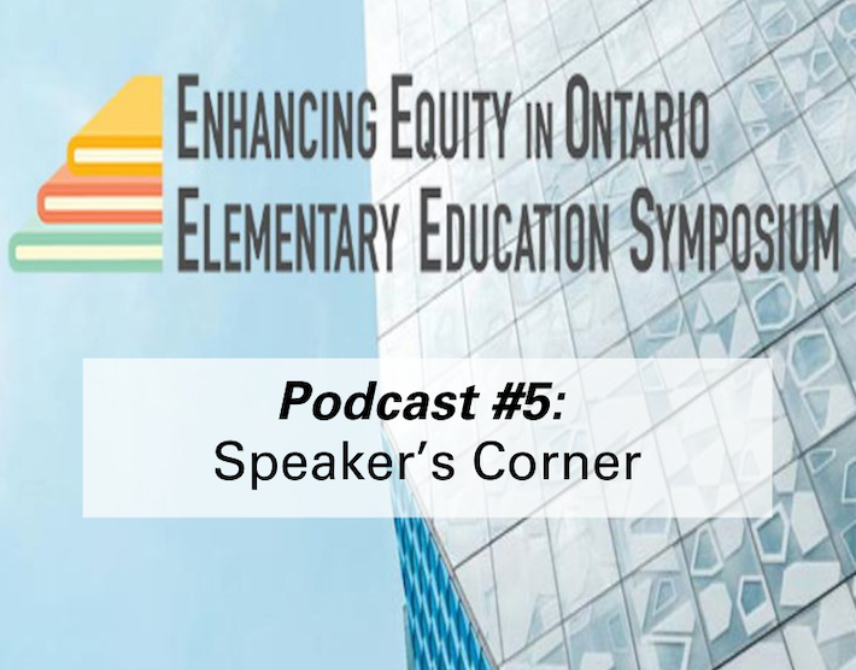
In this episode of Enhancing Equity in Elementary Education, host Stephen Hurley engages in a thought-provoking Speaker’s Corner conversation with Pam Agawa, the Human Rights and Equity Lead for Keewatin Patricia District School Board. With her extensive background in education and recent experience working with the provincial government, Pam discusses the complexities and daily challenges of promoting equity and human rights in education, as well as her efforts to support students, families, and staff.
The discussion addresses the shift from research to actionable steps, the importance of community relationships, and innovative approaches to overcoming systemic barriers. This episode provides listeners with practical insights into the strategies being employed to enhance equity in Ontario's elementary education system, highlighting the ongoing efforts to create inclusive and supportive learning environments.
Some key messages from this episode include:
- Action Over Research: Pam emphasizes the need to move from continuous data collection to implementing concrete actions that address educational equity challenges.
- Community and Relationships: Establishing strong, reciprocal relationships within communities is crucial for the success of equity initiatives.
- Innovation and Precedent: Pam advocates for innovation in overcoming systemic barriers. She stresses the importance of collaboration among educational leaders across different districts to set new precedents and push the boundaries of established protocols.